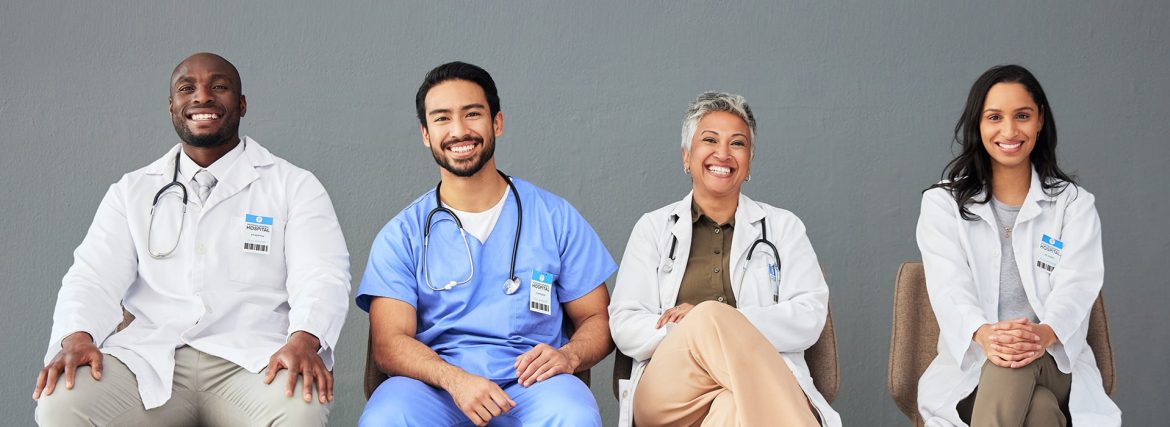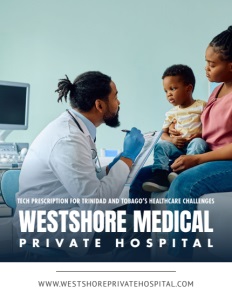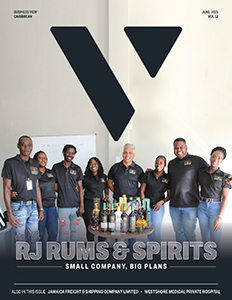Tech Prescription for Trinidad and Tobago’s Healthcare Challenges
How one Trinidad hospital is pioneering digital transformation to tackle chronic disease and rising costs
The premier hospitals of the Caribbean face an existential choice: embrace digital transformation or risk obsolescence. At Westshore Medical Private Hospital in Trinidad, Stephen King embodies this urgency. The 60-year-old Chief Operations and New Business Development Officer describes himself as “not the typical baby boomer,” and his ambitious plans prove it. While the region grapples with a 10-year lag in digital health fundamentals, King is architecting a radical departure from traditional hospital operations.
“It’s interesting for me that where I sit is between the technology business and developing new businesses and services,” says King, whose title change in 2024 signals Westshore’s strategic pivot. “Recently the board changed my title from Chief Operations Officer to Chief Operations and New Business Development Officer, which is important because it’s a very different focus. Instead of looking at the facilities, we are really looking at the business, its efficiencies, systems, and how to differentiate Westshore.”
The hospital’s current state reveals the magnitude of change ahead. Despite housing 50 beds, three operating theatres, and partnerships with specialized units like the Advanced Cardiac Institute, Westshore still operates on paper-based systems. “EMR, online scheduling, telemedicine, nothing, zero,” King states bluntly about the technological infrastructure after more than two decades of operation. This gap becomes more striking considering Trinidad and Tobago’s relatively high financial inclusion rate of 80.8 percent, well above the Latin American and Caribbean average, and the government’s establishment of a dedicated Ministry of Digital Transformation in 2021.
From Paper to Online Portal
Westshore’s digital transformation centers on an ambitious portal that reimagines patient engagement. Rather than a conventional website, King envisions a sophisticated platform hosted on Amazon Web Services or Microsoft Azure that fundamentally changes how patients interact with healthcare services.
“I go to a website, any of the hospital websites, I really don’t know what may be wrong with me. And then there’s a list of endocrinologists, cardiac surgeons, and it’s not patient centric,” King explains. “What are your symptoms? That’s a good starting point. So, what I’m trying to do is build this. When you come to our digital portal, you are going to be educated, you are going to establish your risk factors along the chronic diseases of Trinidad and the region—diabetes, hypertension, high blood pressure.”

The portal is more than a technological advancement. With the Inter-American Development Bank estimating that 15 percent of deaths in low and middle-income countries could be prevented through digital healthcare transformation, King’s approach addresses both immediate patient needs and systemic healthcare challenges. The platform will integrate artificial intelligence tools for risk assessment, pushing patients toward appropriate care pathways based on their profiles.
“The main issue at this stage is using the web portal to educate the patient, bring business, and of course make electronic health records available to the person should they have to go to public healthcare afterwards or another specialist,” says King. “A lot of people don’t take their records with them, and they end up spending more money redoing things that were done previously. Can’t remember when they did the CT scan, so they went under another one.”
The Family Medicine Clinic Model
Central to Westshore’s transformation is the establishment of a family medicine clinic that breaks from the hospital’s traditional tenant model. Launched in February 2024, the clinic represents Westshore’s first wholly owned medical service, giving King direct control over implementing digital innovations.
“I’m looking at it differently because we can’t control the patient or the doctor, even when it comes to setting up electronic medical records,” King says of the traditional specialist model. “It’s a messy, old model which needs to be changed. The traditional Westshore specialists aren’t even using any of the basic tools like scribing, speech to text, to medical notes and coding. They are still scribbling with a pen. It really shocked me as the premier hospital in Trinidad and Tobago.”
The clinic serves as the testing ground for Westshore’s broader ambitions. King has implemented OpenEMR, an open-source electronic medical records system. “We’ve customized it significantly. I chose OpenEMR because it’s open source, it’s a vibrant community, and we have access to do whatever we want,” he explains.

Beyond basic digitization, the clinic anchors Westshore’s expansion into telemedicine and home healthcare services. King’s vision includes remote point-of-care diagnostics and traveling nurses equipped with portable devices, innovations particularly relevant as the Caribbean population ages and chronic disease management becomes increasingly critical.
“Now that I’ve got that hub, I’m looking for things like breast density diagnostics for breast cancer, which does not need a radiologist in any form or fashion,” says King. “Those types of new diagnostic tools that the clinic can use are going to be another differentiating factor.”
Reshaping Healthcare Economics
King’s most innovative initiative involves partnering with Guardian Group, Trinidad and Tobago’s largest insurance company, to create a co-branded wellness policy that flips traditional insurance models. Rather than waiting for illness, the partnership emphasizes preventive care to reduce late-stage treatment costs.
“If it had been found at eight, that’s a different cat and fish,” King says, referring to his own prostate cancer diagnosis that revealed a PSA level of 22.8. “The insurance companies therefore don’t have that late-stage treatment, and late-stage treatment is 300,000 TT dollars. And that’s done here. So I have built the proof of concept.”
The partnership addresses a critical gap in Caribbean healthcare financing. While Trinidad and Tobago historically spent only 3.75 percent of GDP on healthcare compared to the regional average of 5 percent, the wellness approach could significantly reduce costs for both insurers and patients. The policy would include annual executive medicals, blood tests, clinic consultations, and specialist referrals, all aimed at early detection.
“Normally it takes two or three meetings before you get the VP warmed up. This was different,” King recalls. “Guardian Group just happened to mention what I was working on, and the VP said, ‘Get a meeting.’ That’s not usual.”
International partnerships also fuel Westshore’s transformation. Frank Kreel, introduced through the British Commission Trade Desk, has become a key advisor, connecting King to global health technology innovations. “He goes to all the conferences and expositions. He’s been helping me quite a lot, giving me free guidance,” says King. During a scholarship trip to India, King discovered advanced telehealth systems and point-of-care devices that could transform Caribbean healthcare delivery.
AI-Powered Patient Monitoring
King’s experience as a patient at Westshore revealed critical gaps in the hospital’s technological infrastructure. During his prostate surgery recovery, he watched nurses manually record vital signs every hour, a practice that belongs in the past, not in a premier Caribbean hospital.
“I realized that the patient monitors were low level. They had to come in and write down blood pressure, literally come in and write down everything every hour,” King recalls. “But you’ve got patient monitoring systems that keep track of that. So you just download a file.”
His solution involves implementing centralized monitoring systems from General Electric and Mindray that incorporate artificial intelligence modules. These systems represent a significant leap forward, particularly given that only 18.7 percent of US hospitals had adopted any form of AI by 2022, placing Westshore at the forefront of regional innovation.
“GE and Mindray are using AI modules to be predictive. It will be able to look at many different variables and see them change where a human just can’t compute that,” King explains. “It can predict you are going to have a crash, not wait till it is crashing. That sort of early warning software embedded stuff excited me.”
The financial model for this technology highlights King’s innovative approach. Rather than large capital expenditures, he’s negotiating subscription-based partnerships that ensure continuous upgrades. “As GE’s equipment advances, we advance. After three years, they changed the equipment. We’re still paying them a monthly fee,” he says. “That’s a different partnership model with GE that I’m trying to achieve. In Trinidad, that is not the normal model.”
Personal Experience Drives Professional Innovation
King’s push for technological advancement gained personal urgency following his 2024 prostate cancer diagnosis. The experience exposed him to both the limitations of traditional invasive surgery and the unrealized potential for minimally invasive procedures in Trinidad and Tobago.
“There was a spinoff because the scarring needed to be removed and blocked my urinary tract. So, I recognize that there’s a dependency at most hospitals on invasive surgeries,” King reflects. “That spun me into researching what are the alternatives. And in Trinidad and Tobago, there are very few noninvasive or minimally invasive surgeries happening, which surprised me.”
His research revealed a troubling pattern. Despite evidence showing comparable outcomes, surgeons rarely discuss noninvasive options with patients. “The noninvasive surgeries, I looked them up and they’re just as good. However, the surgeons aren’t going to tell you that,” he states. “There’s a lot of negatives to invasive surgery, especially when it comes to the prostate.”
The experience reinforced King’s determination to modernize Westshore’s approach to care delivery. His interest in robotic surgery, sparked through Frank Kreel’s introduction to CMR’s British robotic systems, represents part of this vision. While cost considerations have temporarily shelved the robotic surgery initiative, King maintains the connections and continues exploring alternatives.

“Frank actually came down here, did a presentation for all our doctors. They were very happy,” King says. “The difficulty was the cost of equipment. So that’s on the back burner, but I still have that network with Frank, and he introduces me to other people and keeps growing depending on our interest.” This personal journey through the healthcare system as both executive and patient provides King with unique insights into the transformation Westshore needs.
The Road Ahead: Challenges and Opportunities
Despite King’s ambitious vision, implementing change at a 23-year-old institution presents significant challenges. “I don’t like bureaucracy at all. I’m used to a smaller outfit that makes decisions and moves, not asking permission, ‘What do you think?'” King admits. “Because a lot of the time they don’t know what to think. It really is how you pitch it to them, which is sort of counterproductive because the bureaucracy isn’t a value-add. It’s a hindrance along the way.”
The board chairman has urged King to focus on achievable short-term goals rather than his expansive long-term vision. “The chairman says to me, ‘You are very eloquent. You put across ideas, and you seem to be able to bring someone that has no idea of technology along with you.’ He says, ‘But focus, Stephen, focus,'” King recounts. “My projects are so wide, they are all interconnected. But he is saying “focus on what you can achieve over the next three months.”
King has developed a roadmap that balances immediate wins with transformational change. The family medicine clinic continues growing its clientele through targeted digital marketing campaigns. Plans for specialized services, including diabetic wound care facilities, align with Trinidad’s chronic disease burden. The co-branded insurance product with Guardian Group awaits final approvals.
“I tend to be very busy and easily distracted,” King acknowledges with characteristic candor about his working style. Yet his energy and vision position Westshore at the vanguard of Caribbean healthcare transformation. As the region races to close its digital health gap, King’s initiatives offer inspiration for private hospitals seeking relevance in an increasingly connected world.
At a Glance
Who: Westshore Medical Private Hospital
What: A 50-bed private hospital undergoing digital transformation from paper-based systems to AI-powered healthcare delivery
Where: Trinidad and Tobago
Website: www.westshoreprivatehospital.com
PREFERRED VENDORS/PARTNERS

GMD Healthcare is specialized in products of Diagnostic Imaging, Ultrasound, anesthesia and service support in the healthcare industry. Is part of Global Médica, a multinational group with operations in the Caribbean, which for more than 39 years has been an authorized distributor of General Electric Healthcare. The Support and Technical Service team forms the complement of our entire advice and sale process.
GMD Healthcare www.gmdhealthcare.com



